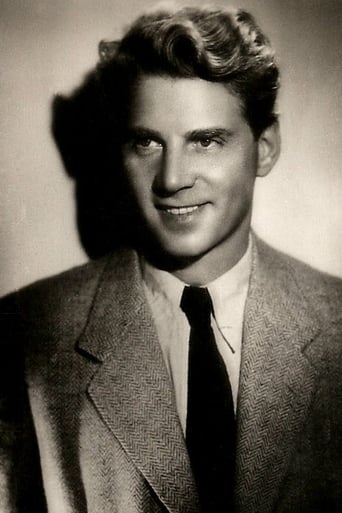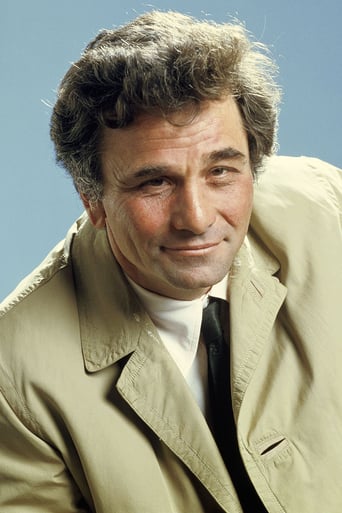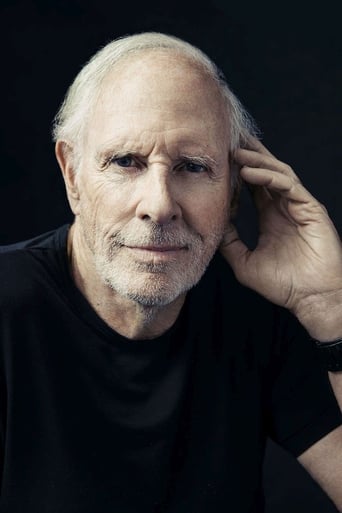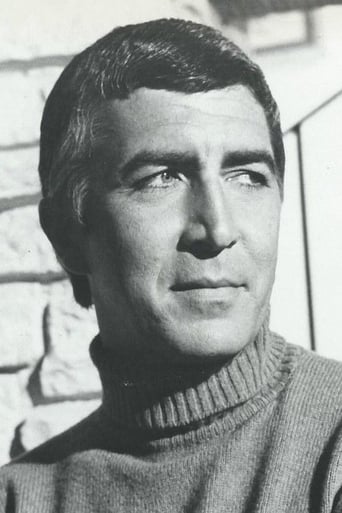Alicia
I love this movie so much
Linkshoch
Wonderful Movie
Glimmerubro
It is not deep, but it is fun to watch. It does have a bit more of an edge to it than other similar films.
Geraldine
The story, direction, characters, and writing/dialogue is akin to taking a tranquilizer shot to the neck, but everything else was so well done.
L P
'Castle Keep' ('CK', 1969), a largely forgotten film of the WWII genre, provides an intriguing & carefully woven narrative that unfolds like an extended episode of 'Combat' (1962-66) or 'The Gallant Men' (1962-63). Featuring action sequences among the most masterfully crafted in the genre, 'CK' is not a large battle epic, but instead focuses on fleeting personal narratives that provide a dark & dramatic atmosphere in comparison to the typical 60's WWII genre film. 'CK' depicts a smaller slice of the 'Battle of the Bulge' (1965) by concentrating on the personal dynamics of a small group of soldiers. Some may see 'CK' as a prelude to 'On A Midnight Clear' (1992), but the essence of the 60's, such as in 'Kelly's Heroes' (1970) & 'Catch 22' (1970), is unmistakable. Superb cinematography, an adequate digital transfer (room for improvement), excellent editing (with only minor continuity flaws-you have to be incredibly attentive to be aware of), & brilliant script (not without some weak dialogue), all mark this production that provides an alternative perspective to the typical WWII action/drama fare. While somewhat unconventional & experimental in its approach, 'CK' is laden with symbolism (if you look for it), dark humor, & philosophical content that touch on war's futility. Carefully crafted scenes of action & suspense among the drama/dialogue, makes 'CK' a film that can be recommended to all WWII genre viewers, including the casual interest viewer, but is likely not what may appeal to the action-heavy WWII genre enthusiast, or action film lover. For similar themes consider: 'The Train' (1964); 'Escape To Athena' (1979); 'When Trumpets Fade' (1998); 'Mediterraneo' (1991); 'Battleground' (1949); & 'Two Men Went to War' (2002). Also consider: 'Silent Night' (2002); 'A Walk in the Sun' (1945); 'Attack' (1956); 'Big Red One' (1980); 'Sahara' (1943); 'Bronenosets Potyomkin' (1925); 'Resistance' (2003); 'The Dawns Here Are Quiet' (1972); 'El Laberinto del Fauno' (2006); & 'The Cuckoo' (2002).
zardoz-13
Clearly, Academy Award winning actor Burt Lancaster must have gotten along well with director Sidney Pollack because they made two films together: "The Scalphunters" (1968) and "Castle Keep" (1969) and Pollack contributed in the one in between, "The Swimmer," that Lancaster appeared in for director Frank Perry. A one-eyed U.S. Army commander, Major Abraham Falconer (Burt Lancaster of "Elmer Gantry), leads a squad of eight soldiers, consisting of three officers, two sergeants and three enlisted men soldiers into the Ardennes Forrest in 1944. They billet themselves in a breathtaking 10th century castle in Belgium on the eve of the historic Battle of the Bulge. The dry humor comes through the dialogue that cleverly undercuts each situation or predicament that our protagonists encounter. If fantastic photography guaranteed that a movie would be artistically great, "Night of the Generals" lenser Henri Decaë would make this the rule rather than the exception. His widescreen cinematography is a consistent treat for the eyes and the pictorial compositions are well-balanced and imaginative.Director Sidney Pollack and scenarists Daniel Taradash of "From Here to Eternity"(1953) and David Rayfiel of "Valdez Is Coming" (1971) adapted the novel by David Eastlake. "Castle Keep" emerges as a surrealistic World War II action epic. Major Falconer and his men defending the castle against an onslaught of German troops and armor. During the first half of this 106-minute movie, castle owner Count of Maldorais (Jean-Pierre Aumont of "The Siren of Atlantis") welcomes Major Falconer, Captain Beckman (Patrick O'Neal of "El Condor"), Lieutenant Amberjack (Tony Bill of "Ice Station Zebra"), Sergeant Rossi (Peter Falk of "Anzio"), Sergeant DaVaca (Michael Conrad of "Sol Madrid"), Corporal Clearboy (Scott Wilson of "In Cold Blood"), Private Allistair Piersall Benjamin (Al Freeman, Jr. of "The Lost Man"), and Elk (James Patterson of "Lilith") to the castle and hope that they will defend it from the enemy. Principally, Maldorais wants them to save his works of art and hopes that the virile Major will get his classically gorgeous wife, Therese (Astrid Heeren of "Silent Night, Deadly Night"), pregnant because the count is impotent and needs a male heir.After the Americans settle in—Falconer warms up the master bedroom with Therese, the soldiers head into town to the Red Queen brothel, while Rossi befriends the widow of a baker (Olga Bisera of Women in Cell Block 7") and starts baking bread. Captain Beckman gives lectures about the artworks in the castle. Not-surprisingly, Beckman was one an art historian. Falconer shows up in town and shows the prostitutes how to design Molotov cocktails and then throw them at German tanks when they enter town. The funniest scene involves Corporal Clearboy and the Volkswagen beetle that he finds on the premises. Late one night, two G.I.s set out to destroy the VW bug by pushing it into the moat. The bug floats so they shoot at it below the waterline to sink it. Corporal Clearboy awakens to the sounds of gunshots and scrambles for the stairs. A fellow soldier tells him to take the shortcut through another door. Clearboy opens the door and spaces on air. The door opens on the moat and the G.I. plunges into the moat, but he swims to the VW, cranks it up and drives it up onto dry land. The second half concerns the castle defense and a brief but explosive battle with tanks blasting away at the architecture as well as the Americans concealed behind it.Despite its pretentious, cool attitude toward warfare, "Castle Keep" qualifies as a traditional war movie, but it is far from conventional. The action boils down to a desperate siege with no hope in sight for relief. Indeed, some of the best World War II era films dealt with gallant last stands, such as "Wake Island," "Bataan," and "China." The Germans constitute a faceless enemy. Pollack keeps them at arm's length so we have no reason to hate them. The Americans are a cross-section of the United States and they are basically good guys who like to loaf when they get a caught. Major Falconer is a straight-up guy who does not lord it over his men. Nevertheless, despite its handsome production values, splendid photography, this World War II movie rarely generates any suspense because it the Americans are not portrayed in a sympathetic light and everything seems arbitrary. The performances are all good. Lancaster delivers a tight-lipped, no-nonsense performance as the disciplined commander with a purposeful manner. Pollack invests very little sentiment when the characters die. None of the Americans receive historic treatment. The sight of the castle burning is hypnotic. One of the most iconic character actors of the 1960 thru the 1980, perennial villain Bruce Dern turns up as a raggedly deserter who leads a religious sect. You can tell that "Castle Keep" is an anti-war movie because it refuses to glorify warfare. The problem with "Castle Keep" is that it doesn't have enough sarcasm to be a satire and it lacks exuberance in its combat sequences to be a warmongering classic. Interestingly, "Castle Keep" fails to measure up to its own—or perhaps Beckman's--definition of good art. According to Beckman, great art but disturb and awaken its audience. Sadly, "Castle Keep" neither disturbs us enough nor awakens us.
winner55
A cult film that Columbia Pictures has done the devil to bury, keeps resurfacing because of it's exceptional poetry, invention, and flawless execution - on the part of director, editor, and camera crew, but also thanks to some of the most powerful acting on film, especially from Lancaster and Falk.The writers and the director have striven hard to push the boundaries of cinematic story telling, and to do so without looking 'low budget', as many other more intellectually advanced films of the period did.In the last analysis, calling this film 'anti-war' is as inappropriate as saying that of Sam Fuller's "Big Red One". Like Fuller's film, this is simply war as it was fought - garnished, for dramatic (and comic) effect, with more than a touch of the undeniably surreal. But as Fuller made plain in his wholly realistic film, war creates just the sort of environment where the surreal happens.BTW, what made this a cult film in the first place is not any 'anti-war' message (the message is actually more 'anti-European' if you follow the dialog closely), but rather its remarkable comedic sense of the absurd, made most famous by the affair with the Volkswagen, but actually more impressive with Falk's baker (who moves in with the Belgian town's baker's wife, because, well, that's what bakers do, they live with baker's wives).All this adds up to a stunning, even shocking film, that is still highly entertaining. I suspect those that find it confusing haven't lived much life yet, or don't want to. This film is not dated in the least; it will survive all the CGI crap that Hollywood vomits up, as long as there are people who want to think and to feel while watching a film.
lost-in-limbo
Travelling through Ardennes forest, American Major Falconer leads his small rag-tag platoon to the medieval castle that belongs to the Count of Maldorais, so they can use it as a stronghold against the German soldiers. Waiting for this possible strike, they go about amusing themselves by relaxing or taking in the sights. The Major is bedding the Counts wife, Captain Beckman studying and admiring the count's artwork, Sergeant Rossi living his dream of having wife, child and baking. Private Benjamin storming up ideas of a possible novel, while Corporal Clearboy falls head over heels for a Volkswagen. But their lifestyles are shattered when finally the Germans advanced through the forest and upon the castle.You want a very offbeat and ambitious war drama; look no further then Sidney Pollacks' dreamlike majestic oddity "Castle Keep". However it tends to be one of those cult films you'll love or be totally put off by its artsy approach. I'm the former. I was totally spellbound by its quirky, bleak and theatrical sense of style interwoven within its lyrically verbose script and moody, self-conscious characters. Adapted from William Eastlake's novel, this is pretty much a calm conversational piece that likes to philosophically reflect on itself with a haunting and decisive charge, before it changes pace (and somewhat direction) to actually lead up to a loud, chaotic, brutal and taut action climax in the dying stages of the film.Pollacks' smooth n' breezy execution leads the way to a slow plodding pace, where it's a clash of personalities and a lot little trivia set in motion. War is pointless and simply made up of absurdity, and that's how Daniel Taradash and David Rayfiel's thoughtfully satiric screenplay lets the story unfold, because honestly it treads water and doesn't sway far from its base work. Seeping off it are random, unexpected sub-plots (like fairy-tale strokes) with Private Benjamin's crisp narration (which it's his story were watching) seem to have a metaphysical current. The rich humour within is uniquely pulled-off, by holding an uncanny, absurd and odd feel. Beautifully crafted and ultra-stylish with many bold and surreal flourishes. One of those few includes the sequence in the rose garden and the wonderfully amusing set-up of the Volkswagen. It was like looking at a painting, just admiring the art in front of you. Then move onto the next frame for another poetic image. But the life is sapped out of it, with more so a deadpan quality making its way into Pollacks' slick direction.Henri Decae's fluidly illustrative cinematography was picture-perfect with atmospheric lighting, and Michel Legrand's harmoniously spiralling and intrusively baroque music score only adds to its disorienting make-up and cooks up a tuneful awe. Streaming through it was a bold, psychedelic edge due to the times. The beautifully lush backdrop of the wilderness, and grand appearance of the extravagant castle are vibrantly captured to provide another hypnotic dimension to the well-looking production. The performances are astounding. Burt Lancaster's stoically dominating portrayal, with a smart slight tongue is excellently delivered and Peter Falk's no-nonsense, grounded to reality performance is superb as the baker at heart Sergeant Rossi. Don't you just love the smell of fresh bread. Patrick O'Neal is credibly solid as the toey, art-loving Captain Beckham, and Jean-Pierre Aumont as the sly Count of Maldorais. Astrid Heeren is seductively silky as the count's wife/niece Therese. The rest of the support Scott Wilson, Tony Bill, James Patterson, Al Freeman Jr. and Michael Conrad were exceptionally good. Also Bruce Dern is a delight to watch as the fruity, preaching American deserter who has taken up on god's side, as he tries to convince others to do so.Uneven, but still a one-of-a-kind experience. Almost just like a dream.






